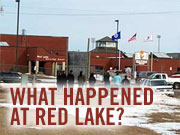March 21, 2005
Red Lake, Minn. — (AP) - The Red Lake Indian Reservation, where 10 people died in a shooting spree Monday, has a unique status.
The Red Lake Band of Ojibwe, which has more than 2,700 enrolled members, has long fought off attempts to divide the reservation into privately owned plots of land, so its more than 830,000 acres remain under tribal ownership.
According to the 2000 census, 5,162 people lived on the reservation, and all but 91 were full-blooded Indians.
The tribe is one of the poorest in the state. Nearly 39 percent of the families on the reservation live below the poverty line. The reservation is about 240 miles north of the Twin Cities, and the town of Red Lake is about 75 miles south of the Canadian border.
Because the reservation is so remote, the tribe has largely missed out on the lucrative casino revenues that some other Minnesota tribes enjoy. The profits from its Seven Clans Casinos in Red Lake, and off the main reservation in Warroad and Thief River Falls, pale before those earned by tribes closer to the Twin Cities.
That's why tribal leaders decided to join with two other northern Ojibwe bands in Gov. Tim Pawlenty's proposal for a joint state-tribal casino in the Twin Cities area, a proposal that's pending before the Legislature.
The tribe and the federal government have primary law enforcement authority on the reservation, and serious crimes that happen there are prosecuted in federal court instead of state court. The tribe can jail someone for only up to a year.
Outsiders are often unwelcome on the reservation. Tribal police ordered reporters off the reservation after Monday's shootings. Nonmembers are not allowed to fish on any part of Lower Red Lake, or on most of Upper Red Lake.
In the winter of 2002, tribal conservation officers confiscated the plane of a pilot who landed on the frozen lower lake hoping to sample the phenomenal crappie fishing. It took him more than six weeks of negotiations, $4,000 in fines and another $2,000 in legal fees to get his plane back.
Most of the shootings happened at Red Lake High School, which has an enrollment of over 300 students, according to the school's Web site.
(Copyright 2005 by The Associated Press. All Rights Reserved.)




